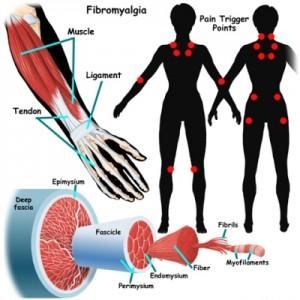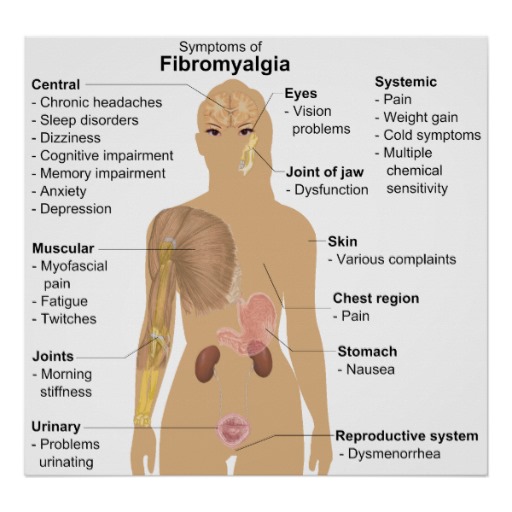|
BOOK NOW |
ASK ABOUT YOUR PAIN |
Home > Blog > Physiotherapy > Chronic Pain Physio > Fibromyalgia Physiotherapy
Fibromyalgia Physiotherapy

Fibromyalgia refers to a very painful condition where patients suffer from pain within the muscles and connective tissues.
Patients often report that their pain is generalized (global), long term (chronic) and have an increased pain experience to normal sensations especially pressure. Eg a regular touch on a patient with fibromyalgia may lead to a over-bearing and overwhelming pain experience.
Symptoms may not only be pain per se, but also comes often with severe:
- tiredness/fatigability (sometimes misdiagnosed as chronic fatigue syndrome)
- inability/difficulty sleeping
- joint/muscle tightness
- very wary of surroundings and fear of being touched/touching things
Some patients report unusual experiences such as
- difficulty drinking
- difficulty swallowing foods
- difficulity with bladder movements
- difficulty with bowel movements
- general sense of numbness/tingling all over
Unfortunately, fibromyalgia is often associated with psychiatric conditions such as
- clinical depression
- clinical post-traumatic stress disorders (PTSD)
Every patient experiences fibromyalgia differently (in their own ways), and not all experience the same symptoms nor the same severity or mix. About 3% of global population has this condition, with 90% being female and 10% being male.
Fibromyalgia is often medically classified as a combination of both musculoskeletal and neuropsychiatric (because it's so associated and linked), and patients often respond to a combination of:
- pharmaceutical medicines
- psychology interventions including cognitive behavior therapy
- social interventions including patient, family and caregivers in the process
- physiotherapy and hand therapy for exercise therapy and pain management
Signs and Symptoms

As mentioned earlier, patients with fibromyalgia:
- may experience different types/mix of pains (location, body part etc)
- may experience different severity of the pain mix
- may experience different frequency of the pain mix
- may experience different time of pain
The common defining symptom is that the pain is long term, generalized, tiredness/fatigability and increased sensitivity to pain with normal touch/pressure.
Other symptoms that patients also reported includes
- numbness and tingling
- muscle contractions
- muscle spasms
- generalized weakness
- muscle twitchings and flickerings
- bladder and bowel control difficulties
- sleep difficulties (getting and staying and getting back to sleep)
Many fibromyalgia patients report experiencing a form of brain dysfunction, usually termed as 'brain fog', where they feel or experience
- poor concentration
- short term- and long termed- memory loss
- decreased reaction time
- difficulty in multi-tasking
- poor
attention span.
Almost all fibromyalgia patients report feeling anxious, worried and depressed. (Patient may consider craniosacral therapy and BodyTalk to complement physiotherapy sessions with us)
Other related symptoms include myofascial pain, also known as trigger points, which can cause localized or referred pain to nearby structures, and unfortunately these referred pain may trigger a nervous system response.
Causes of fibromyalgia
- Genetic predisposition ie your family has ever have/had a history of fibromyalgia, your disposition to have it will increase
- High stress may be a "tipping point" that starts the triggering of active fibromyalgia
- Intense cold may also be a tipping point
- Abnormal serotonin metabolism
- Deficient growth hormone (GH) secretion
- Psychological factors eg stress, depression, loss
- Physical trauma such as accidents, falls, injuries, operations etc
fibromyalgia Treatments

Treatments are segmented into three broad categories: pharmaceutics, investigational medicine and physiotherapy.
- Pharmaceutical
- currently, Lyrica, Cymbalta and Milnacipran are the three main medications that
are FDA approved. Other medications that are often prescribed also
include antidepressants, anti-seizure medication, dopamine agonists,
muscle relaxants and opioids
- Investigational medications - cannabinoids and the 5-HT3 receptor antagonist tropisetron
- Physiotherapy - regular exercise physiotherapy with our senior physiotherapists will bring a combination of benefits, and the most direct ones are improved strength, stamina and cardiovascular ability will increase your ability to participate in work, life and responsibilities.
It will also improve your pain experience (lower) and improve your sleeping patterns. Patients often report improved energy levels and decreased agitation/hyperirritability. We may prescribe regular clinical Pilates as well, to improve your core strength.
We also recommend regular deep tissue massage therapy (will start gentle) to decrease tight muscle knots as well as desensitive your hypersensitivity to touch (important), as well as craniosacral therapy (CST) and BodyTalk.